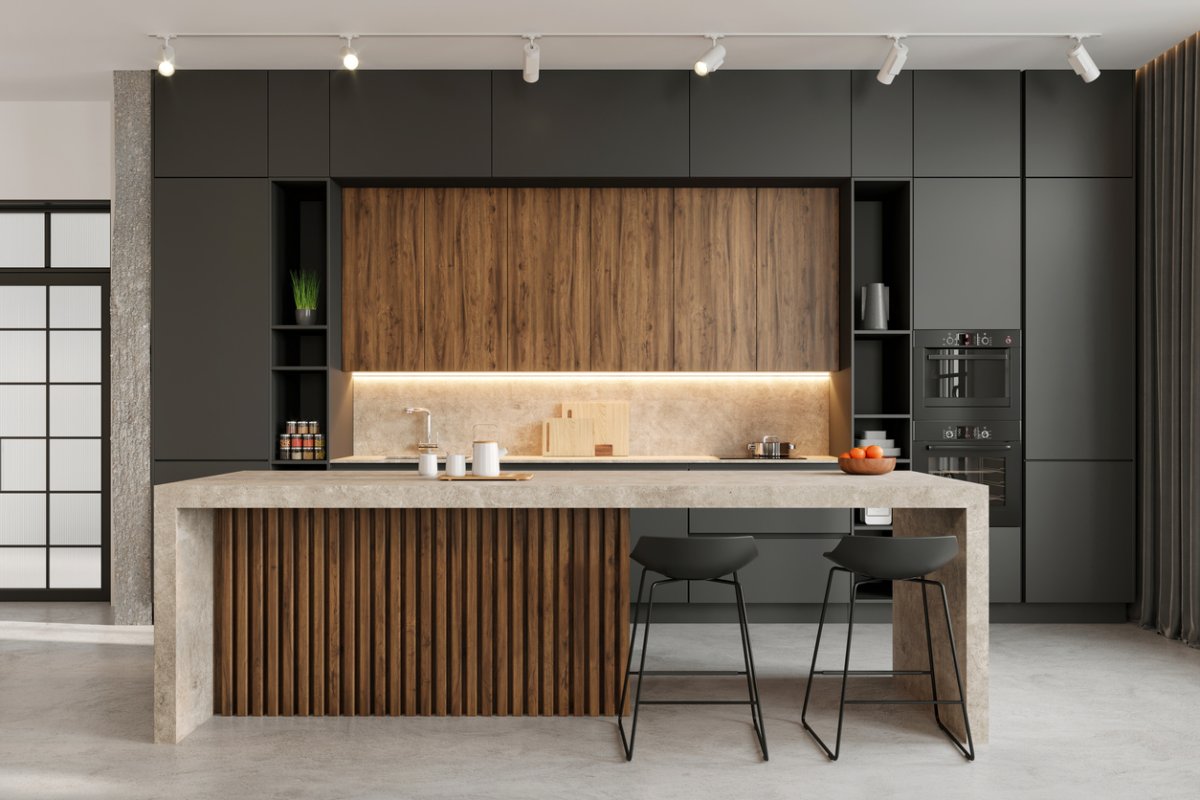We may earn revenue from the products available on this page and participate in affiliate programs. Learn More ›
Highlights
- The average concrete countertops cost is $3,500, while the range is about $1,500 to $6,000.
- Homeowners planning their countertop budget will need to factor in the countertop size, the type of concrete they prefer, and the thickness and finish, along with current labor rates and any additional customizations.
- Many homeowners are opting for concrete countertop installation since concrete countertops offer durability, heat resistance, lots of customization options, and increased home value.
- An improperly installed or poured concrete countertop can spell disaster in a short period, which is why most homeowners skip the DIY route and hire a professional concrete installer to ensure a quality product that will last.
Concrete countertops are a unique design option for kitchens and bathrooms since the material can be customized with preferred finishes, designs, and edges. Many concrete countertops can be colored or stained in a variety of hues to match a multitude of interior design preferences. Homeowners may wonder, “How much do concrete countertops cost?”
According to Angi and HomeAdvisor, the average concrete countertop cost ranges from $1,500 to $6,000, with many homeowners spending $3,500. This price can fluctuate depending on a wide array of factors, including the size and thickness of the countertop, the finish, the installation location, and local labor prices. For example, the material cost per square foot can range from $50 to $150, and labor pricing can run from $30 to $90 per hour.
The type of concrete counters (polished, poured, or precast) also influences the price. Each type has its own characteristics and advantages, which will impact both labor and material costs. Customization is a key aspect of concrete countertops, allowing homeowners to tailor their countertops to their specific preferences. Homeowners can weigh the benefits of installing concrete countertops in their homes to make an informed decision.
Factors in Calculating Concrete Countertops Cost
While the national average of $3,500 is a good indicator of where to start for budgeting purposes, the overall price of concrete countertops can differ due to important factors such as the size, type, thickness, and the finish of the countertops; local labor prices; and the location of installation.
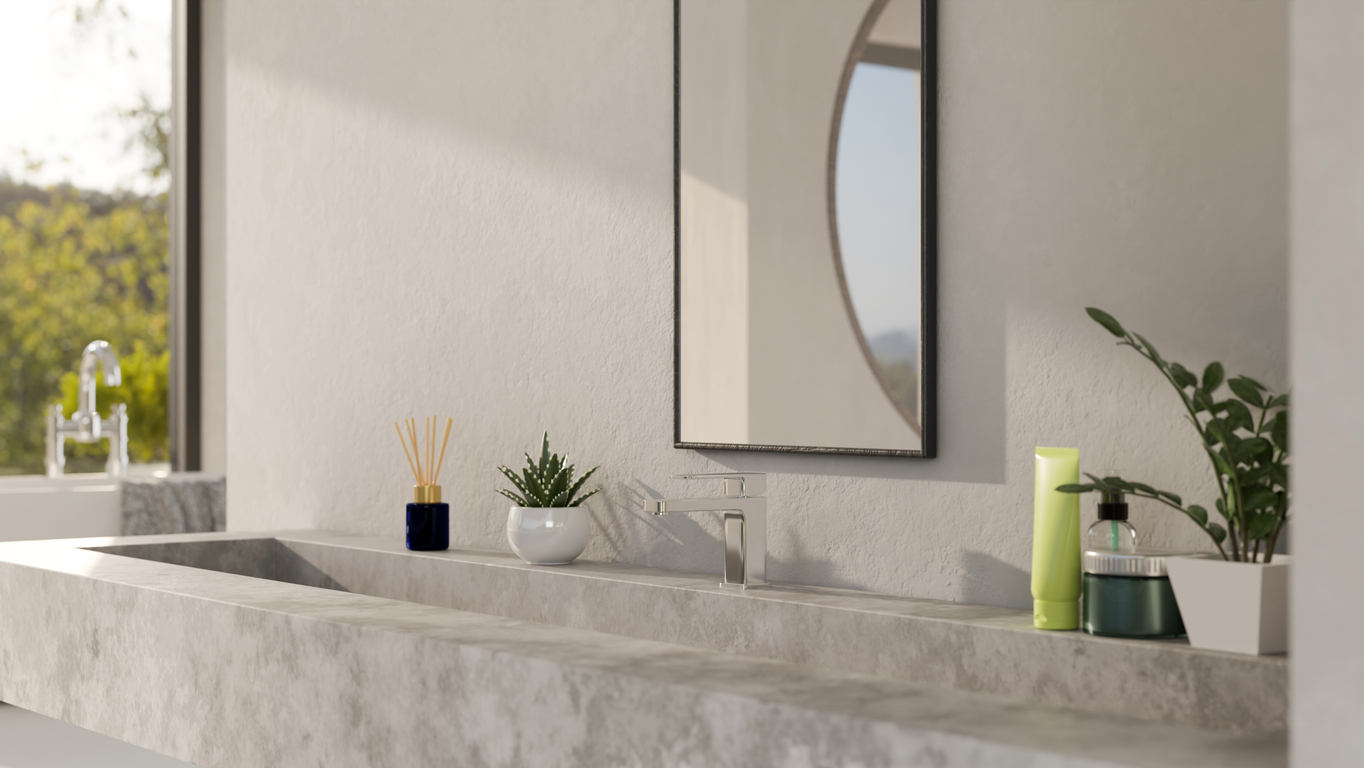
Size and Type
The size of the countertop directly influences the overall installation cost. As a general rule, larger surfaces require more materials and labor. As the size of the countertops increases, the concrete countertops cost per square foot often decreases due to volume pricing. On the other hand, smaller areas or complex designs could require more time and labor, which increases the cost per square foot.
The type of concrete countertop is another factor that affects price. Polished, poured, stained, and precast concrete countertops all come with varying installation and material costs. Poured concrete countertops require precision work during the pouring stage that happens onsite. Precast concrete countertops are made off site and installed in slabs in the home. Almost any concrete countertop can be finished through labor-intensive grinding and polishing for a shiny surface. Homeowners who want color or intricate designs added to the countertop can expect a higher-range cost than the average to account for the extra time and labor.
Concrete is an attractive option for budget-conscious homeowners, and the ability to create white concrete countertops or stained concrete countertops allows homeowners to design their kitchen or bathroom just the way they want. And while learning how to make DIY concrete countertops may intrigue the most experienced DIYers, the better option is to hire a professional who knows how to install a countertop that will last.
Thickness
Concrete countertops are available in various thickness options, though 1.5 to 2 inches is the most common. Thicker countertops cost more, while thinner ones will be more budget-friendly. Since thicker countertops use more concrete, the additional weight may require the cabinets to have additional reinforcement, which can raise the overall cost of concrete countertops. Thicker countertops cost more, but they do have a longer lifespan and more resistance to wear and tear.
Finish
Concrete countertops can be finished in a few ways to achieve different textures and colors, with each finish option having its own price range and considerations. For homeowners in the market for cheap countertops, it’s helpful to know that wood, butcher block, and plain concrete countertops are less expensive than stained concrete countertops.
- Basic or plain concrete countertops. Basic concrete countertops come in a plain gray color with a matte finish. With no staining, coloring, or polishing, this type of countertop can cost approximately $50 to $100 per square foot.
- Colored concrete countertops. With the addition of concrete countertop colors during the mixing process, the hue of the concrete can be modified to suit the decor of the rest of the room. Finishing concrete countertops with color increases the cost to about $60 to $100 per square foot.
- Stained or polished concrete countertops. Staining concrete countertops is a process that adds layers of dye-based paints and lacquers after the cement has cured. This type of finish can mimic the look of marble, wood, or any other type of material. Polishing finishes the concrete with intensive grinding to achieve a shiny surface. Both polishing and staining significantly increases the price of the countertops, by $100 to $150 per square foot on average.
“Because concrete is naturally porous, I recommend applying a protective sealer to the countertop surface to prevent the absorption of water, cooking oils, and food stains,” says Jim Peterson, founder of ConcreteNetwork.com, an online source for decorative concrete information, products, and service providers. “Just be sure to use a non-toxic, food-safe concrete sealer designed for use on kitchen countertops. As long as your concrete countertop is properly sealed, routine cleanup will be easy—simply wipe away spills using a mild dish soap or other pH-neutral cleaner. Avoid the use of aggressive scrubbing pads or abrasive cleansers that can wear away the sealer.”
Labor
Labor prices can fluctuate based on the local labor rates and the demand for professional services. The cost to install professional concrete countertops ranges from $30 to $90 per hour, or from $50 to $150 per square foot. On average, labor makes up 90 percent of the cost of concrete countertops.
Installation Location
Concrete countertops are appealing for their durability and unique look, and they work well in various locations around the home. Some of the most popular places to install concrete countertops are in the bathroom, kitchen, and outdoor kitchen.
- Bathroom. Since many bathroom countertops are smaller in size, concrete countertops may have a higher per-square-foot price that increases the cost of a bathroom remodel. Concrete countertops are an excellent choice for a bathroom, since they’re durable and require minimal maintenance. The average concrete bathroom countertop ranges in cost from $500 to $1,400. If a homeowner doesn’t want to tackle a bathroom makeover on their own, they can hire one of the best bathroom remodeling companies to ensure the job is done right.
- Kitchen. On average, the cost of concrete kitchen countertops ranges from $2,000 to $6,000. While kitchens come in a variety of sizes, the average kitchen has about 30 square feet of countertop space. An island is usually smaller, so the average cost range for island concrete countertop installation is $800 to $2,200. It’s recommended that concrete countertops in a kitchen be sealed to protect against staining, with yearly reapplication to prevent long-term stains.
- Outdoors. For homeowners with an outdoor kitchen, installing outdoor concrete countertops is a popular option that requires little maintenance. Many outdoor kitchens have between 12 and 20 square feet of countertop space, which results in an installation cost of about $2,100 to $3,500. Concrete isn’t recommended as an outdoor material for countertops in regions that experience freeze and thaw cycles throughout the winter months.
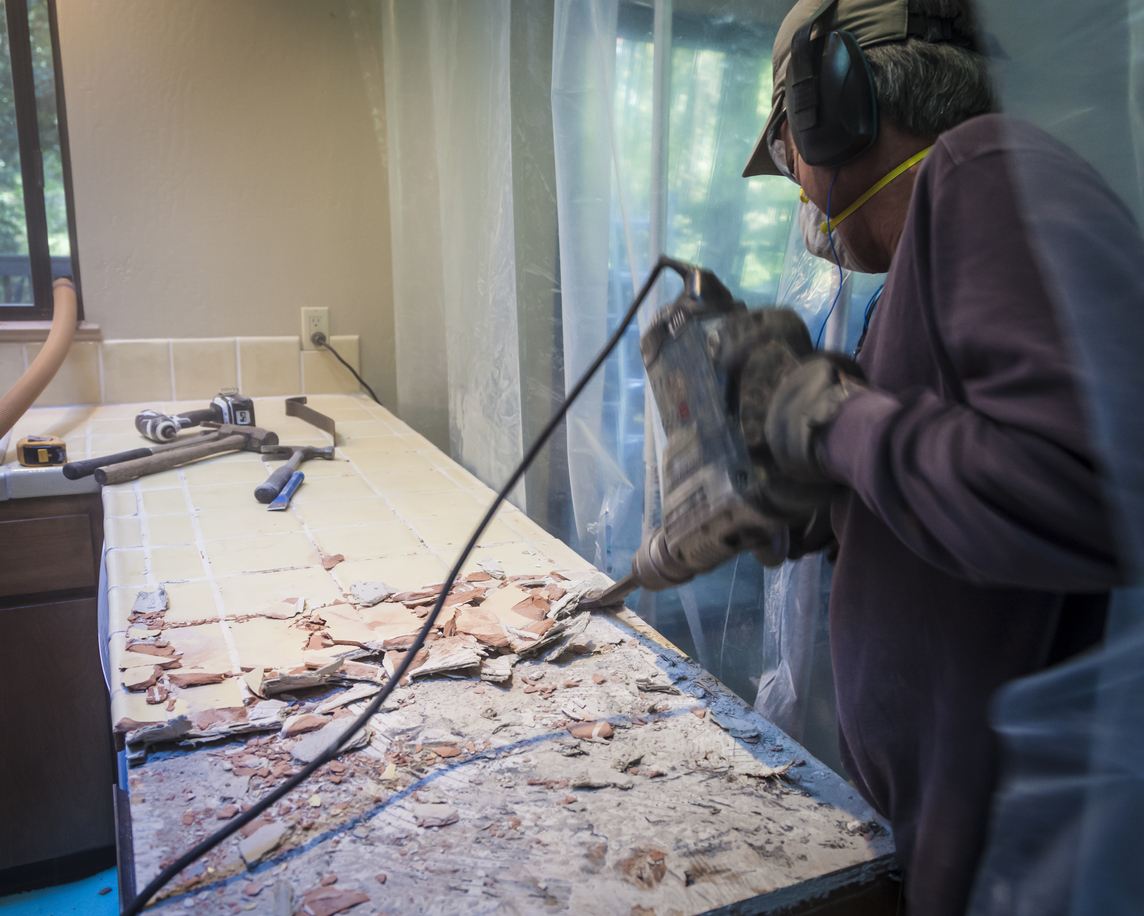
Additional Costs and Considerations
Knowing what goes into the cost of countertops involves careful consideration of additional factors, which can include existing countertop removal, customizations, plumbing or electrical work, sink and faucet replacement, and cabinet reinforcement. Understanding these factors can help homeowners budget accurately for their concrete countertop installation project.
Existing Countertop Removal
Removing any existing countertops is an important factor that can sometimes be overlooked when homeowners are calculating project costs. Removing the old countertops involves detaching the countertops, disconnecting plumbing pipes, and disposing of the debris. While some countertop installation companies will provide this service free of charge, others can add between $50 and $200 for removal.
Customizations
One of the biggest draws of a concrete countertop is its versatility and ability to be customized in various ways, though customization comes at an additional cost. Adding complex patterns or designs to concrete countertops will require additional expertise and labor. Generally, the more intricate the design, the more expensive the labor costs. Homeowners can also choose the type of edge they want on their countertops, along with any additional customizations such as the addition of a sink or backsplash.
| Type of Customization | Average Cost (Materials and Labor) |
| Backsplash | $600 to $1,300 |
| Beveled edge | $2 to $6 per square foot |
| Bullnose edge | $2 to $6 per square foot |
| Eased edge | $1 to $5 per square foot |
| Sink installation | $250 to $650 |
| Square edge | Standard—no additional cost |
Plumbing and Electrical Work
Plumbing and electrical work may be needed to install sinks, faucets, and electrical outlets, which can increase the countertop installation or the cost of a kitchen remodel. Adding a sink to concrete countertops requires plumbing work, and homeowners can expect to pay between $45 and $150 per hour for a professional plumber to reconfigure the plumbing. To relocate or install new electrical outlets, an electrician will charge from $50 to $130 per hour.
Sink and Faucet Replacement
The process of pouring and installing cement enables an integrated sink to be cast at the same time as the countertops. These seamless sinks add a modern sleekness to a kitchen or bathroom for just $250 to $650. If a homeowner opts for a different sink material, the type and size of the sink will also impact the price, so a luxury or stainless steel sink could cost up to $1,500 to install. Drop-in, undermount, and farmhouse sinks all have different installation requirements, and larger sinks typically need more installation time.
Designer and high-end faucets are typically more expensive to install since the materials often cost more and require additional installation time. Adjustments to the plumbing for new faucets can include modifications to accommodate the new fixtures and replacement of the old pipes. The difficulty of the plumbing project will determine the overall price.
Cabinet Reinforcement
Making concrete countertops is only part of the job that needs a professional’s expertise. To support the weight of concrete countertops, the cabinets may need frame reinforcements or plywood subtops. This can raise the price of the installation job depending on the cost of materials and labor. Most contractors or cabinet installers will charge an hourly rate between $30 and $90 to reinforce cabinets. They’ll need to know the exact dimensions and thickness of the countertop being installed to determine how much reinforcement is required.
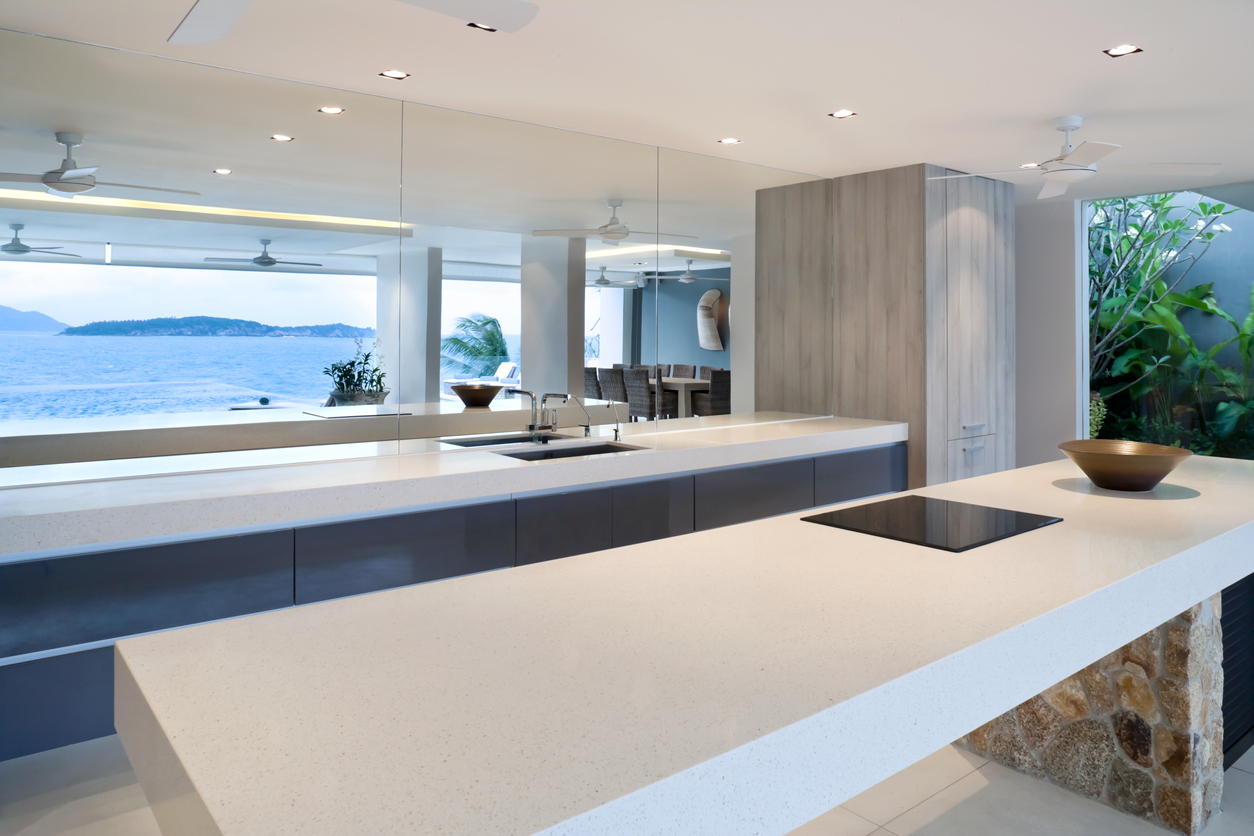
Types of Concrete Countertops
Concrete countertops cost can vary significantly based on the type of countertop. The different types of countertops—polished, poured, and precast—have their own characteristics and price ranges.
| Type of Concrete Countertop | Average Cost (Materials and Labor) |
| Polished | $100 to $150 per square foot |
| Poured | $50 to $145 per square foot |
| Precast | $65 to $150 per square foot |
Polished
Polished concrete countertops are created by grinding and buffing the concrete surface. This is a labor-intensive process that has a higher labor cost than other finishes. Typically done by using progressively finer grits to buff the concrete until it has a mirror finish, this effect can also be achieved with topcoats and sealants. It’s important to seal this finish so it doesn’t dull over time. Polished concrete countertops cost from $100 to $150 per square foot.
Poured
Poured concrete countertops are installed on-site, which means the frame and countertop mold are transported to the home. The processes of mixing the concrete, pouring, and finishing the surface needs more on-site attention than precast options, which will increase the overall price. Additions such as custom edging or the embedding of specific materials in the countertop typically require the use of poured cement. Most poured concrete countertops prices range from $50 to $145 per square foot.
Precast
Precast concrete countertops are made off-site then installed in the home. This process can be a preferred method for many countertop professionals since the concrete can be poured into a mold within the controlled climate and conditions of a factory. Precast countertops cost between $65 and $150 per square foot.
Benefits of Choosing Concrete Countertops
Kitchen and bathroom cement countertops are becoming more popular due to the various benefits of the material. The appeal of concrete countertops includes durability, heat resistance, customization options, and increased home value.
Durability
For homeowners who want a long-lasting and resilient countertop surface, concrete is a popular choice. It’s a strong material that can stand up to the daily wear and tear of high-traffic kitchens and bathrooms. When it’s properly sealed, concrete is resistant to chipping, cracking, scratching, and other types of damage.
“Durability is [a] big plus,” says Peterson. “Under normal use, a concrete countertop is unlikely to ever need replacement and will often last the life of the home.”
Heat Resistance
Concrete is usually heat resistant; however, this is not the case when it’s treated with a sealant. Hot pots and pans can be placed directly on unsealed concrete without causing damage, but if a sealant has been applied, it can discolor the sealant.
Customization Options
Compared to other kitchen countertop materials, concrete can be widely customized for outdoor use or high-traffic kitchens. Its durability makes it a versatile material that can be tailored to meet the needs and demands of homeowners.
“I think the biggest advantage of concrete countertops is that they give you unlimited options for customization,” says Peterson. “You can choose the exact color and shape you want, pick a unique edge profile, and add decorative embeds, like pieces of colored glass or stone. You can also have custom features cast into the countertop, including drainboards, trivets, and cutting boards.”
Increased Home Value
Depending on the type of concrete and its condition, concrete countertops can add value to a home. They offer a modern, luxurious look at a lower price point than other types of countertop materials.
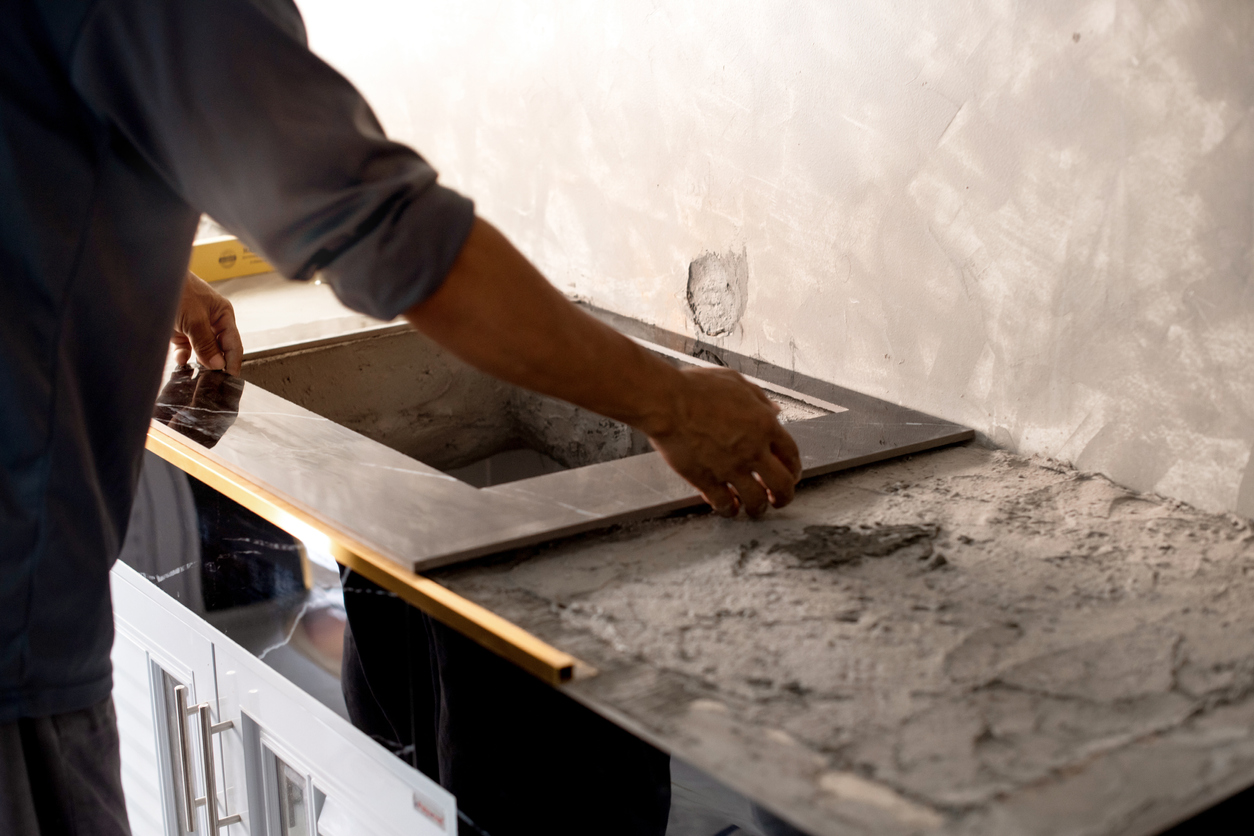
Concrete Countertops Installation: DIY vs. Hiring a Professional
Concrete countertops offer a distinctive appeal, and they can adapt to various styles and designs within a home, whether it’s industrial or farmhouse. DIY enthusiasts might find themselves intrigued by the prospect of crafting their own custom concrete countertops, which can save money on labor costs. However, it’s important for homeowners to recognize the number of tools and materials as well as the amount of equipment that is needed, such as concrete countertop mix, concrete countertop forms, mixing tool, miter and table saw, rubber mallet, plastic sheeting, sealant, and so much more.
In short, DIY concrete countertops are a much more complex and experience-driven task than they may seem, which is why it’s a better idea for homeowners to hire local concrete countertop contractors to ensure a seamless and polished finish.
Mistakes or inconsistencies can result in structural issues or problems with the countertop not being level or even. While it may be tempting to save money on labor costs, the cost of specialized tools that are required for pouring concrete countertops can add a significant amount to the overall project.
Opting for professional concrete countertop installation can also ensure an expert finished product. Experienced countertop contractors and the best kitchen remodeling companies have the skills, knowledge, and expertise to mix, pour, and install a concrete countertop without mistakes and in a timely manner. While the overall cost of the project will be higher, many homeowners prefer paying more if hiring a professional saves them time and guarantees professional results.
How to Save Money on Concrete Countertops
Transforming a kitchen, bathroom, or outdoor space with concrete countertops doesn’t have to break a budget. By considering these money-saving tips, homeowners can spend less on concrete countertops.
- DIY countertop removal. Homeowners can remove and dispose of old countertops to help save money on labor costs.
- Limit the customizations. While concrete is an excellent option for customizations when the budget allows, adding intricate designs can increase the project cost.
- Choose standard colors. Custom colors can be much more expensive than standard colors or natural hues.
- Opt for a thinner profile. Thinner countertops require less material, which reduces the overall cost. Homeowners are advised to speak with a professional to ensure the intended countertop thickness will work for its intended use.
- Use simpler finishes. Elaborate finishes such as high-gloss polish can add to the cost. Using simpler finishes can save money.
- Ask about recycled materials. Using recycled materials in the concrete mix can be cost-effective and eco-friendly. It’s recommended that homeowners discuss their options with their countertop contractor for more information.
- Get multiple estimates. Homeowners will want to get at least three estimates from reputable countertop professionals in their area to find a price that works with their budget.
- Consider financing the project. When money is less readily available, homeowners may want to look into one of the best home improvement loans or the best home equity loans (such as from U.S. Bank or Flagstar Bank).
Questions to Ask About Concrete Countertops Installation
When homeowners are interested in hiring a professional to install concrete countertops, it’s important to ask questions to ensure a successful project. Homeowners will benefit from a discussion with a professional countertop contractor in order to make informed decisions and ensure they get the countertops they want.
- How long have you been working with and installing concrete countertops?
- Can you provide references and examples of past installation projects?
- Are you licensed and insured?
- What is the estimated cost of the installation?
- Are there any additional costs I should be aware of during the installation process?
- Will you provide a detailed breakdown of the pricing?
- What type of concrete do you recommend?
- What are the differences in pricing for different finishes?
- How can design choices affect the overall cost?
- How long will it take to install my concrete countertops?
- How do you handle unexpected delays?
- Do you hire subcontractors?
- Can you explain the installation process?
- Do you provide any warranties or guarantees for your work?
- Which of the best concrete sealers will you use?
- How do I take care of the countertops?
- What can I do to prolong the lifespan of my concrete countertops?
- What can I do to prepare the space for installation?
- Does my space require structural modifications for the countertops?
- What kind of plumbing or electrical work is needed?
- What is your payment plan?
- Do you offer any financing options?
- Are cleanup and disposal included in the price of the countertop installation?
- How can I leave a review of your work?
FAQs
Installing concrete countertops can improve the functionality and look of a space while increasing the property value. Questions can arise when homeowners are preparing for a countertop installation project, and knowing about some of the frequently asked questions regarding concrete installation cost can help homeowners budget effectively for the project.
Q. Are concrete countertops cheaper than granite?
On average, the cost of granite countertops ranges from $40 to $200 per square foot, while the cost of concrete ranges from $50 to $150, so there is some overlap in pricing.
Q. Do concrete countertops crack easily?
There is always a risk of concrete countertops cracking, especially if they weren’t installed properly or if they’re used outside in climates with extremely cold temperatures. If homeowners are worried about their concrete countertops cracking, they can ask about reinforced concrete as an option.
Q. How long does it take to install concrete countertops?
It can take about 2 to 4 hours to pour concrete countertops, and the molds should stay in place for at least 48 hours. The concrete then needs to cure for at least 4 days before sealant is applied. Installing precast countertops in a home is a faster process since they are poured and cured off site.
Q. How long do concrete countertops last?
A properly maintained concrete countertop can last 50 years or more.
Sources: Angi, HomeAdvisor, Fixr, HomeGuide

